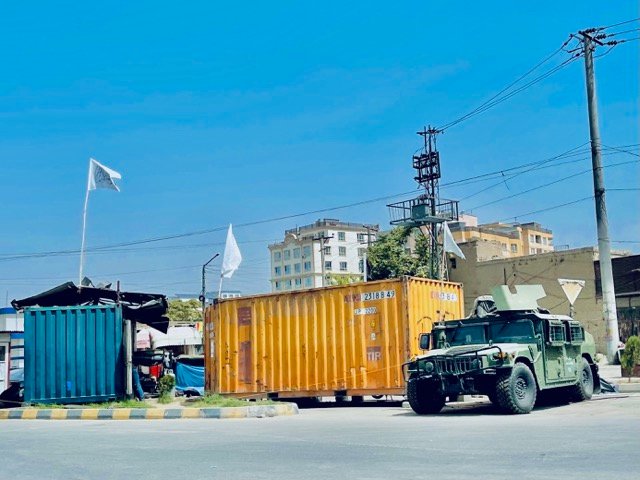A Collapsing Doctrine: Afghanistan Repositions Beyond Pakistan

A Taliban Humvee with the group’s flag in Kabul, 2023. Photo: @AADIL for ADN
By A. Shafaq
For more than four decades, Pakistan treated Afghanistan as a geopolitical extension of its security architecture. Islamabad’s military establishment believed that shaping political outcomes in Kabul would guarantee territorial security, contain Indian influence, and secure a pliant western frontier. This ambition, famously framed as the pursuit of “strategic depth,” drove a complex web of interventions, proxy patronage, border policies, and diplomatic maneuvers that defined the region’s politics.
Yet today, the doctrine lies in disarray. The relationship between Islamabad and Kabul has deteriorated to one of open hostility. The Durand Line remains tense, cross-border firing is routine, trade relations are volatile, and the Taliban leadership increasingly adopts nationalist positions that reject Pakistan’s dominance. In a surprising reversal, Kabul has begun to engage more constructively with India, the very actor Pakistan sought to keep out.
This drift is not accidental. It is the cumulative outcome of Pakistan’s own strategic miscalculations, the Taliban’s unexpected assertion of autonomy, shifts in regional power balances, and the evolving political economy of Afghanistan.
This article examines the structural collapse of Pakistan’s Afghanistan doctrine and the reasons behind Kabul’s growing distance from Islamabad and its emerging openness toward India.
1. The Collapse of “Strategic Depth”: A Doctrine Rooted in Misreading Afghan Nationalism
Pakistan’s concept of strategic depth rested on two assumptions:
1. Afghan factions, particularly the Taliban, would remain permanently aligned with Pakistan’s security interests.
2. Afghan nationalism could be managed or overridden through ideological affinity or economic dependency.
Both assumptions have collapsed.
Afghan nationalism, historically resistant to external domination, has reasserted itself. From King Zahir Shah to Daoud to the Mujahideen to the Taliban, Afghan rulers have rejected foreign dictation. The Taliban’s ultraconservative religious ideology never replaced their intrinsic belief in independence. Their leaders interpret Pakistani influence as a constraint, not a partnership.
Pakistan misread this reality. It overestimated ideological affinity and underestimated Afghan pride, tribal independence, and the Taliban’s internal diversity.
2. Post-2021 Taliban Rule: From Proxy Expectations to Strategic Autonomy
When the Taliban seized Kabul in August 2021, sections of Pakistan’s establishment believed that a friendly administration had returned. The assumption was that the Taliban would suppress anti-Pakistan groups, accept the Durand Line as an international boundary, and align foreign policy with Islamabad’s interests.
Instead, the opposite occurred.
a. The Durand Line Dispute Escalated
The Taliban dismantled border fencing, rejected the line as a legitimate border, and publicly confronted Pakistani military units. This shocked Islamabad, which believed the Taliban would accept the boundary to secure recognition and aid.
b. TTP Resurgence and Pakistan’s Frustration
The Tehreek-e-Taliban Pakistan (TTP), an ideological cousin of the Afghan Taliban, found breathing space inside Afghanistan. Kabul refused to carry out Pakistani demands for large-scale military action against them. Pakistan’s retaliatory airstrikes inside Afghan territory deepened mistrust.
c. Taliban’s Nationalist Identity Overrode Dependency
Even as Afghanistan depended on Pakistan for limited transit, the Taliban leadership rejected any conditionality that compromised national dignity. This expression of sovereignty is at the heart of Kabul’s drift.
3. Pakistan’s Internal Instability Weakened Its Leverage
Pakistan today faces political fragmentation, economic distress, and a severe security crisis. This has weakened its capacity to influence external actors.
- Economic Collapse Reduced Bargaining Power
Pakistan’s economy faces high inflation, currency devaluation, and IMF dependency. This limits Islamabad’s ability to offer meaningful economic incentives to Kabul.
b. Political Volatility Erodes Strategic Focus
Continuous power shifts between civilian administrations and the military establishment have left Afghanistan policy directionless. Afghanistan sees Pakistan as inconsistent and unreliable.
c. Militancy and Internal Security Crises Distract Islamabad
Pakistan is preoccupied with domestic terrorism, separatist movements, and street-level political agitation. This reduces the space for long-term strategic planning.
A weakened Pakistan has fewer instruments to shape Afghanistan’s political trajectory.
4. Afghan Public Opinion Has Shifted Dramatically Against Pakistan
Afghan citizens, including traditional Taliban supporters, increasingly view Pakistan as a destabilizing force. Social media videos, border protests, and popular Afghan narratives reveal a clear pattern:
• Islamabad is blamed for decades of interference.
• Pakistan’s forced deportation of Afghan refugees in 2023 and 2024 created lasting anger.
• Pakistan’s periodic border closures have hurt Afghan traders and families.
This psychological shift matters because the Taliban leadership, despite its autocratic nature, remains sensitive to public sentiment. Any leadership seen as capitulating to Pakistan risks losing legitimacy.
5. India’s Consistent, Long-Horizon Policy Has Created Goodwill and Confidence
India’s engagement with Afghanistan has always followed a simple principle: development, stability, and no interference in domestic politics. This has given New Delhi a distinct comparative advantage.
a. India’s Development Footprint Has Outlasted Regimes
From the Salma Dam to the Zaranj-Delaram highway, from the Afghan Parliament to hospitals and schools, India’s projects have created long-lasting goodwill. These remain symbols of partnership, not geopolitical control.
b. Post-2021 India Adopted a Calibrated Approach
India did not recognize the Taliban but continued humanitarian aid, wheat supplies, medical shipments, and technical cooperation. This balanced model conveyed seriousness and maturity.
c. The Taliban Values India’s Autonomous Policy
Unlike Pakistan, India does not dictate internal political decisions, border policies, or security choices to Kabul. This gives the Taliban space to maintain sovereignty while engaging pragmatically.
6. Regional Realignment Has Reduced Pakistan’s Monopoly Over Kabul
The Taliban regime is actively exploring ties with Iran, Russia, China, Uzbekistan, Turkmenistan, Qatar, Turkey, Saudi Arabia, and India. The region encourages multipolarity in Afghan external relations.
Pakistan no longer has exclusive access to the Taliban leadership. This multipolar environment reduces Islamabad’s ability to shape outcomes. Kabul is benefiting from a broader diplomatic landscape.
7. The Economic Logic: Why Afghanistan Needs India More Than Pakistan
Trade data and regional connectivity trends show clear direction:
• Pakistan frequently blocks Afghan transit trade.
• Indian markets offer higher value for Afghan fruits, saffron, dry fruits, herbs, and minerals.
• Chabahar Port and the International North South Transport Corridor provide Afghanistan with new export channels that bypass Pakistan.
For a landlocked country, diversified access to markets is a strategic necessity, and India is central to that long-term vision.
8. The Security Paradox: Pakistan’s Pressure is Backfiring
Pakistan’s attempts to force the Taliban into compliance have produced the opposite effect. Cross-border strikes, public accusations, coercive diplomacy, and mass deportations have only deepened Afghan distrust.
The Taliban now positions itself as defending national sovereignty against Pakistani aggression. This nationalist posture increases domestic legitimacy and justifies distancing from Islamabad.
Conclusion: The End of an Era and the Emergence of a New Afghan Orientation
Pakistan’s strategic calculus on Afghanistan is collapsing because it relied on flawed assumptions, coercive tools, and a narrow understanding of Afghan nationalism. The Taliban’s assertion of autonomy, combined with Pakistan’s internal crises and Afghanistan’s desire for diversified engagement, has rewritten the script.
As Pakistan’s influence declines, Kabul’s openness to India is rising not out of ideology but out of necessity, dignity, and strategic logic. India’s consistent, development-oriented approach and its emphasis on Afghan sovereignty have helped build a foundation that is far more resilient than any short-term transactional alignment.
Afghanistan is drifting away from Pakistan because it is reclaiming its independence. It is moving closer to India because New Delhi offers stability, respect, and long-term reliability. The regional landscape is undergoing a quiet but profound transformation, and Pakistan’s miscalculations have accelerated this shift.
A. Shafaq (pseudonym) is a researcher and lecturer at one of the private universities in Kabul.
Note: The contents of the article are of sole responsibility of the author. Afghan Diaspora Network will not be responsible for any inaccurate or incorrect statement in the articles.






